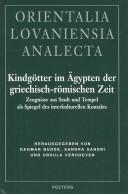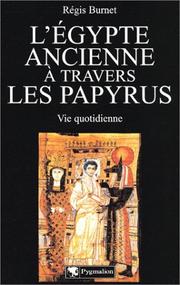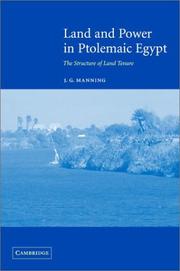| Listing 1 - 3 of 3 |
Sort by
|

ISSN: 0777978X ISBN: 9042913673 9789042913677 Year: 2003 Volume: 128 Publisher: Leuven Peeters
Abstract | Keywords | Export | Availability | Bookmark
 Loading...
Loading...Choose an application
- Reference Manager
- EndNote
- RefWorks (Direct export to RefWorks)
Egypte ancienne --- Egyptische Oudheid --- Egyptische godsdienst --- Religion égyptienne --- Gods, Egyptian. --- Dieux égyptiens --- Egypt --- Egypte --- Religion. --- Civilization --- Religion --- Civilisation --- Academic collection --- Dieux égyptiens --- Gods, Egyptian --- Egypt - Religion --- Egypt - Civilization - 332 B.C.-638 A.D.

ISBN: 2857048106 9782857048107 Year: 2003 Publisher: Paris Pygmalion
Abstract | Keywords | Export | Availability | Bookmark
 Loading...
Loading...Choose an application
- Reference Manager
- EndNote
- RefWorks (Direct export to RefWorks)
Comment parlaient les hommes de l'Antiquité ? Que se racontaient-ils chaque jour ? Les écrits ont généralement disparu et l'on ignore bien souvent tout de leur intimité. Il existe cependant une exception : les papyrus de l'Egypte, miraculeusement sauvegardés grâce à l'aridité du désert. Il s'agit des plus anciens témoignages authentiques qui nous sont parvenus. Découverts il y a plus d'un siècle, les voici réunis pour la première fois dans une anthologie en français. Comment n'être pas fasciné : c'est un héritage direct du temps des pharaons qu'ils nous transmettent ! Entièrement traduits et présentés par Régis Burnet, ces extraordinaires papyrus révèlent une vie surprenante. Loin du ton parfois pompeux des œuvres littéraires, ils nous montrent des hommes de chair et de sang dans leurs préoccupations concrètes et les mille et uns secrets de leur existence quotidienne. Ainsi, mieux qu'à travers tous les récits et les reconstitutions, souvent sujets à caution, le naturel de leurs voix étrangement proches et vibrantes, comme si elles s'adressaient à nous, témoigne en direct et sans emphase de l'intemporalité de l'esprit humain.
Manuscripts (Papyri) --- Papyrus (Manuscrits) --- Egypt --- Civilization --- History --- Cultura y civilización --- Historia --- Papiros egipcios. --- Ancient Egypt --- Papyri. --- Egypt - Civilization - 332 B.C.-638 A.D. - Sources --- Egypt - History - Greco-Roman period, 332 B.C.-640 A.D. - Sources

ISBN: 0521819245 0521044308 9780521819244 0511179294 0511061536 051105520X 0511326106 0511482841 1280430583 1139148788 0511069995 9780511482847 9780521044301 1107135729 9780511061530 9780511055201 9781280430589 9780511069994 9786610430581 6610430586 9781139148788 Year: 2003 Publisher: Cambridge New York Cambridge University Press
Abstract | Keywords | Export | Availability | Bookmark
 Loading...
Loading...Choose an application
- Reference Manager
- EndNote
- RefWorks (Direct export to RefWorks)
This history of land tenure under the Ptolemies explores the relationship between the new Ptolemaic state and the ancient traditions of landholding and tenure. Departing from the traditional emphasis on the Fayyum, it offers a coherent framework for understanding the structure of the Ptolemaic state, and thus of the economy as a whole. Drawing on both Greek and demotic papyri, as well as hieroglyphic inscriptions and theories taken from the social sciences, Professor Manning argues that the traditional central state 'despotic' model of the Egyptian economy is insufficient. The result is a subtler picture of the complex relationship between the demands of the new state and the ancient, locally organized social structure of Egypt. By revealing the dynamics between central and local power in Egypt, the book shows that Ptolemaic economic power ultimately shaped Roman Egyptian social and economic institutions.
Egyptian language.
---
Land tenure.
---
Ptolemaic dynasty.
---
Real property.
---
Land tenure
---
Egyptian language
---
Real property
---
Business & Economics
---
Real Estate, Housing & Land Use
---
History
---
Papyri, Demotic
---
Ptolemaic dynasty,
---
Egypt
---
Economic conditions
---
Antiguidade.
---
Civilização egípcia (aspectos econômicos)
---
Grundeigentum.
---
Papyrus.
---
Verwaltung.
---
Grondbezit.
---
Pacht.
---
Politieke structuur.
---
Ptolemaeën.
---
Sociaal-economische aspecten.
---
Papyri, Demotic.
---
History.
---
Egito Ptolomaico.
---
Demotisch.
---
Ägypten
| Listing 1 - 3 of 3 |
Sort by
|

 Search
Search Feedback
Feedback About UniCat
About UniCat  Help
Help News
News